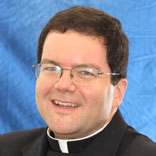Isn’t it strange: that if we were to envision a community of human beings exactly as we would wish it to be — harmonious, mutually supportive, trusting and unambiguously honest, free of misunderstandings and disappointments — we would be describing a community that none of us has ever seen or experienced?
We seem to know instinctively that there is something a bit askew in our human nature. It seems we were created for something better, but somehow we fall short of what we were created to be. Each one of us can sense that not only our environment but we ourselves — every one of us — lives with a primordial wound setting us at odds with our own best selves, and therefore also with God and with each other. What kind of calamity has befallen us?
Chapter 3 of Genesis gives us the answer in symbolic language. At the dawn of human history our first parents, deceived by the Devil, freely disobeyed the laws of their Creator, and their choice had profound consequences not only for them but for every member of the human race who followed them.
While the story encapsulates their disobedience in the image of eating a piece of forbidden fruit, the essence of their sin (as indeed, the essence of every sin of anyone) was the choice of self apart from God, the choice to live not as a creature within an order established by Another but as a self-contained “god” who makes his own rules. This was precisely what the Tempter had promised them: “…you will be like gods….” (3:5)
The destructive quality of this decision is due, not to any vindictiveness on God’s part, but rather to the fact that the human person deprived of the most basic relationship to his Creator is cut off from the very source of his own goodness and cannot prosper. Severed from the source of life, our first parents became subject to the laws that subjected their bodies to the decay and disintegration that overtakes all material nature. Severed from the source of truth, they fell into ignorance and confusion even about the deepest truths of their own being. Severed from communion with God, they fell under the dominion of the one to whose deceptions they had willingly submitted, and found themselves prone ever more constantly toward sin. Severed from the One whose very presence is heaven, they were destined for hell, at least in the absence of God’s intervention.
Tragically, this loss for our first parents was the loss of a heritage that they were given to bequeath to their descendants. Their loss and their servitude became ours as well. They squandered the family “fortune” and so we, as their descendants, are born impoverished.
As Christians, we are invited to acknowledge this tragic story for a very important reason: it outlines precisely the fate from which our Lord Jesus has come to rescue us. Unfortunately, many today seem completely ignorant or incredulous of this condition that our tradition knows by the name of original sin.
Unlike personal sin, this is not a sin that we commit but one that we contract through natural generation. Yet it is aptly called sin, because like personal sin, it places us in a troubled relationship to God, to each other and to ourselves.
In fact, there is a very hopeful way that we can learn to read this dismal story of the fall of the human race and our consequent condition of original sin: it means that this sense of “at-oddsness” that we experience is not our final destiny but a backdrop for the much greater story of salvation.
If it seems “unfair” that God allows us to be born into a condition affected by a sin committed before we were born, that misfortune pales into insignificance before the fact that the Lord remedies our plight by offering us a salvation that raises us to a dignity unimaginable even to our first parents in their original justice. Beyond merely raising us back to the integrity and harmony enjoyed by our first parents before their fall, our Savior raises us up to the incomparable dignity of adoptive divine sonship through the sacrament of baptism.
It is for this reason that parents owe it to their children to have them baptized as soon as possible after birth: they have already passed on to their children a human nature subject to death because of sin. In presenting them for baptism, they can now pass on to them a participation in God’s own nature bestowing on them a life that will never pass away.
Those of us whose parents chose for us this heavenly life at the beginning of our earthly lives will spend the rest of eternity thanking them for so great a gift. And instead of lamenting our native condition of original sin, we can then sing as the Church does in the Easter Vigil: “O happy fault … that gained for us so great a Redeemer!”
(For more, read Catechism of the Catholic Church, nn. 385-421; or United States Catholic Catechism for Adults, pp. 68-75; or Youcat, nn. 67-70)




Share this story